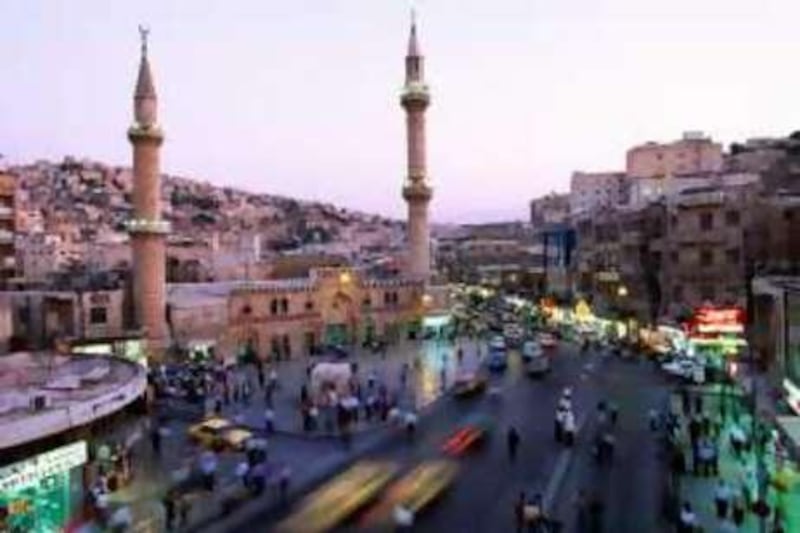On most evenings in Amman, the rich scent of jasmine fills the humid air in nearly every neighbourhood. Heavy banks of the flower sprawl on walls that encircle grand villas, cast doorways in perpetual shade and complement the stunted olive trees on the streets. If jasmine is the scent most associated with the city, then the call to prayer that sometimes follows or precedes the peal of church bells is the sound of Amman.
Amman, the original city of brotherly love - its ancient name was Philadelphia - is a sprawling metropolis divided into seven connected "circles" or roundabouts, like a spine running through the city. It is hilly, but also noisy, polluted and sometimes crossing the street feels like you are playing Russian roulette with your life. Shopping malls, highways, modern glass buildings, all of this can be found in Amman, but the best things about it are those that suggest a time when shopkeepers sipped tea outside their shops and chatted to one another.
The old carpet shop is more likely to have been replaced with the latest mobile phone store, but Amman retains its old-fashioned charms if you know where to look. Walk to the citadel and gaze at the great temple of Hercules built in the first century AD. Then turn and look at the view across the city: a charming jumble of white buildings and houses whose outer façades, by law, must be built with local stone. The view is even more rewarding at sunset because the city takes on a rosy white glow.
The best restaurant in town is Fakr el Din, which serves gorgeous Lebanese food in an elegant old villa in the Jabal Amman neighbourhood. You will be greeted by the dapper host in a foyer decorated with a lavish spray of flowers and an oriental carpet. It is a favourite of the city's elite. One of the house specialities is kibbe nayeh, raw minced lamb with cracked wheat and parsley. At the end of the meal order a shisha; the slender pipes are encased in silver.
For a more earthy experience, head to the Reem Cafeteria in second circle. It is a misleading name; it is not a cafeteria at all, but a roadside shwarma stand which always has a queue. For a few dirhams you get a beef shwarma wrapped in very thin Arabic bread and stuffed with onions and tomatoes. It is a city institution and popular with everyone from taxi drivers to businessmen. When your stomach is full and you need a bit of culture, head to the Amman Archaeological Museum, which showcases artefacts dating from 100,000 BC to the 16th century. Among the most important items in the collection is the bronze Dead Sea scroll, but you will also see pottery, glassware, jewellery and all sorts of items that have characterised daily, ordinary life for millennia.
There are many places to shop. The Mecca mall is always packed at night with the Jordanian middle classes and the City Centre is a bit more upscale. For something special, go to the Jordan River Foundation downtown which sells beautiful, high quality soft furnishings. They include handmade blankets, quilts and table runners in embroidered silks. It is not cheap - I spotted a soft burnished gold quilt for about $300 (Dh1,102) - but well worth it, not just for the quality, but because JRF is a non-profit foundation which helps poor communities.
Or head to Balian Ceramics Jerusalem on Rainbow Street downtown, which has been making dishes, vases and tables since 1922. The original store is in Jerusalem and still owned by the same family. If you ask nicely, they will show you the studio at the back where you will find workers concentrating intensely on getting the flourish of a peacock's tail just right on that turquoise tile. If you tire of city life and want to see something different, go to the Dead Sea, which is an hour's drive from Amman. It is easy to flag a cab in the capital and the cluster of hotels around the Dead Sea are a landmark which every driver knows about.
Check yourself into the Mövenpick Dead Sea Resort and Spa, or for something a bit more glitzy, the Marriott next door. They are both situated on the seashore.
Slather the famous Dead Sea mud all over your body - it is much vaunted for its healing properties - then find yourself a sun lounger. When your limbs are dry and cracked, take a dip in the warm sea to wash it all off. Enjoy the sense of well-being and contentment. But don't even think of putting your head under water because the salt will sting your eyes for hours.
hghafour@thenational.ae






